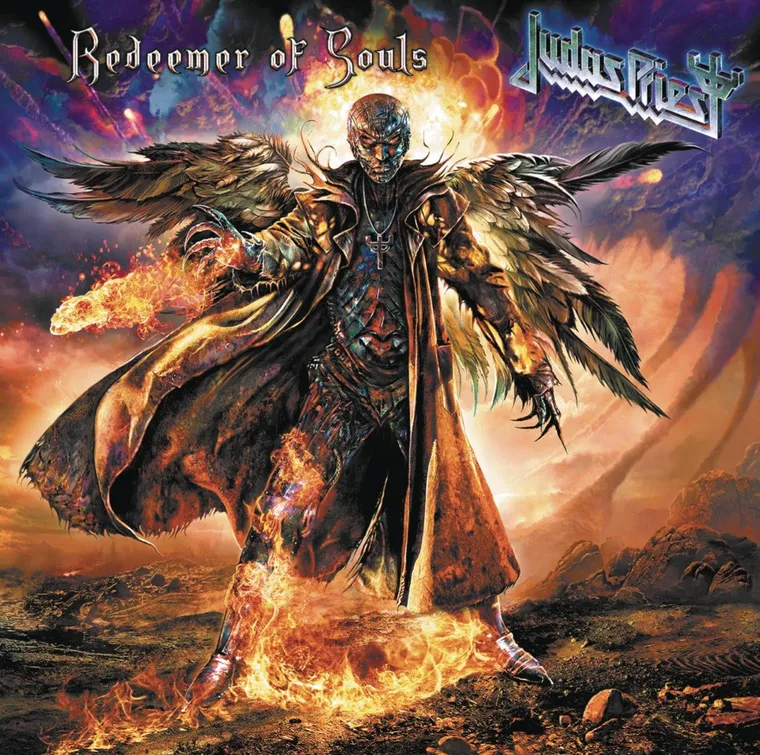Released on July 8, 2014, Redeemer of Souls is the seventeenth studio album by Judas Priest—and it’s a fiery reaffirmation of the band’s identity, proving that the Metal Gods still have thunder in their veins.
Where 2008’s Nostradamus veered into conceptual grandeur and orchestral textures, Redeemer of Souls dials things back to what Priest does best: galloping riffs, powerful choruses, and the unmistakable snarl of Rob Halford. It’s not about reinvention—it’s about rekindling the flame.
And while many legacy bands struggle to match the fire of their earlier years, Priest does something rare here: they tap into their roots without sounding like a parody of themselves. Redeemer of Souls isn’t a throwback—it’s a battle cry, delivered with conviction, grit, and surprising freshness.
Redeemer of Souls: The Fire Returns
The album opens with “Dragonaut,” and the message is immediate: this is Judas Priest returning to heavy metal fundamentals. The riff is mid-tempo, chugging, and thunderous. There’s no pomp, no prologue—just molten steel in audio form. Halford’s vocals are lower and more seasoned but still piercing with menace. The chorus? Classic Priest: catchy, commanding, and fist-raising.
Then comes the title track, “Redeemer of Souls.” It’s as close to a mission statement as the band has offered in years. The twin guitars of Glenn Tipton and newcomer Richie Faulkner weave harmonized leads that sound like echoes of British Steel, but with a modern bite. Halford’s vocal melody is mournful yet defiant, turning the track into an anthem of redemption and resurgence.
By the time “Halls of Valhalla” crashes in—complete with tempo shifts, soaring highs, and Norse-inspired bombast—it’s clear the band is not just settling into comfort zones. There’s ambition here, but it’s channeled through songcraft, not concept. The song builds, burns, and explodes with one of Halford’s most acrobatic performances on the album, growling and shrieking in equal measure. It’s heavy metal theater done right.
Riffcraft and Legacy Weaponry
The true strength of Redeemer of Souls lies in its ability to marry classic metal traditions with fresh, energized delivery. Tracks like “Sword of Damocles” and “March of the Damned” showcase this blend beautifully. The former is an epic mid-album highlight—doom-laden, philosophical, and thick with atmosphere. The riff is slow and brooding, but the song keeps evolving, layering harmonies and dynamics as it marches forward.
“March of the Damned” flips the script—a groove-driven, almost radio-friendly track with a menacing strut. It’s simpler, more direct, and surprisingly infectious. Some fans saw it as too restrained; others recognized it as a necessary palette shift, proving that even in their later years, Priest can write a hook that gets stuck in your head for days.
“Down in Flames” and “Battle Cry” throw open the throttle again. These are pure Priest bangers—ripping solos, double-kick drumming, and choruses that beg to be shouted in arenas. Richie Faulkner, who had the unenviable task of filling K.K. Downing’s shoes, not only holds his own—he shines. His leads are sharp, fluid, and fearless, injecting youthful energy without ever disrespecting the band’s roots.
Darkness, Melody, and Control
What keeps Redeemer of Souls from becoming just another late-career nostalgia piece is its attention to dynamics and mood. “Cold Blooded” is a moody, slower burn, filled with dark melodic tension and clean guitar lines that slither rather than gallop. Halford delivers a colder, more subdued vocal here, and it works—it’s less about range and more about tone, about delivering emotion rather than fireworks.
“Secrets of the Dead” is another mid-tempo monster, thick with haunting harmonies and cinematic atmosphere. It’s not the kind of track that leaps out immediately, but it reveals its strength over repeated listens—a slow, heavy crawl toward something ominous and vast.
The album’s closer, “Beginning of the End,” is unexpected—a ballad steeped in melancholy, wrapped in sorrow and resignation. It's Halford at his most vulnerable, backed by minimal instrumentation and aching melodies. Rather than ending with a bang, Priest lets the record smolder to its conclusion, like the last glow of a fire after a long battle. It’s not what you'd expect—but it’s exactly what the album needs.
Production and Performance: Rough-Edged Precision
Produced by Glenn Tipton and longtime collaborator Mike Exeter, Redeemer of Souls has a rawer, less polished sound than its predecessor. Some criticized the mix for sounding flat or compressed—but that very roughness gives the album a kind of analog authenticity. This isn’t hyper-polished modern metal. It sounds lived-in, worn, and real.
Halford, now well into his sixties at the time of recording, delivers a vocal performance that’s both measured and powerful. He doesn’t try to hit Painkiller-era peaks every few minutes. Instead, he chooses his moments, navigating melody and might with the precision of a veteran. The guitars are ever-present—Faulkner and Tipton mesh surprisingly well, blending Tipton’s melodic phrasing with Faulkner’s youthful energy.
Drummer Scott Travis is rock solid throughout, bringing muscular rhythms and thunderous fills, while Ian Hill’s bass—often subtle in Priest’s sound—adds needed weight and grounding. It’s a band that knows exactly what it wants to do and how to do it.
Final Verdict: 8.5/10
Redeemer of Souls isn’t just a return to form—it’s a declaration that Judas Priest is still a vital, evolving force in heavy metal. It’s not a perfect album, but it doesn’t need to be. What it delivers is far more valuable: honesty, power, and pride in their identity.
For longtime fans, it’s a satisfying continuation of a legacy built on leather and steel. For newer listeners, it’s a solid gateway into the band’s more recent catalog, filled with enough fire and fury to justify the “Metal Gods” title one more time.
This isn’t a swan song—it’s a raised fist.
Standout Tracks
- Redeemer of Souls—the defining anthem
- Halls of Valhalla—epic and theatrical
- Sword of Damocles—moody and intense
- March of the Damned—groovy and memorable
- Battle Cry—pure speed-metal mayhem
- Beginning of the End—somber, vulnerable, and brave

